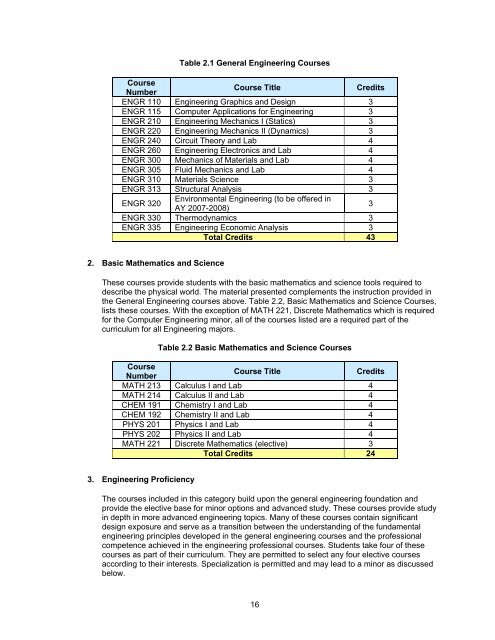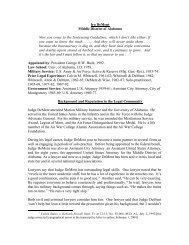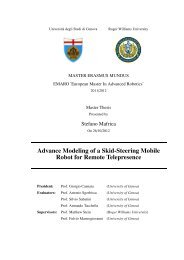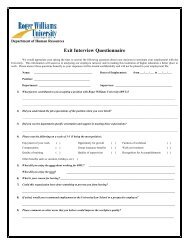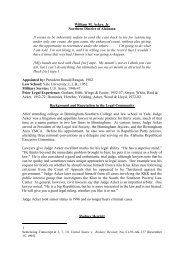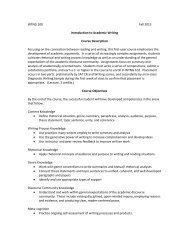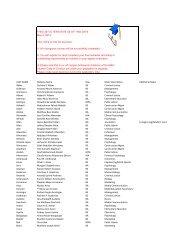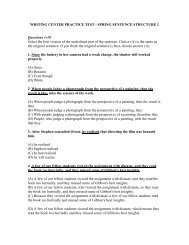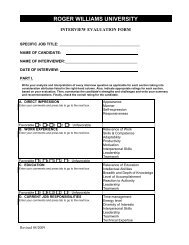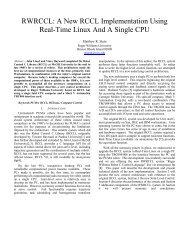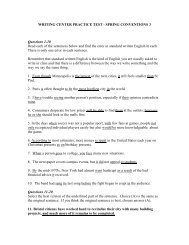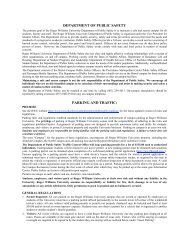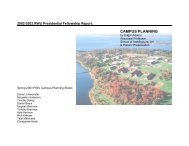SECCM Assessment Plan - Roger Williams University
SECCM Assessment Plan - Roger Williams University
SECCM Assessment Plan - Roger Williams University
Create successful ePaper yourself
Turn your PDF publications into a flip-book with our unique Google optimized e-Paper software.
Table 2.1 General Engineering Courses<br />
Course<br />
Number<br />
Course Title<br />
Credits<br />
ENGR 110 Engineering Graphics and Design 3<br />
ENGR 115 Computer Applications for Engineering 3<br />
ENGR 210 Engineering Mechanics I (Statics) 3<br />
ENGR 220 Engineering Mechanics II (Dynamics) 3<br />
ENGR 240 Circuit Theory and Lab 4<br />
ENGR 260 Engineering Electronics and Lab 4<br />
ENGR 300 Mechanics of Materials and Lab 4<br />
ENGR 305 Fluid Mechanics and Lab 4<br />
ENGR 310 Materials Science 3<br />
ENGR 313 Structural Analysis 3<br />
ENGR 320<br />
Environmental Engineering (to be offered in<br />
AY 2007-2008)<br />
3<br />
ENGR 330 Thermodynamics 3<br />
ENGR 335 Engineering Economic Analysis 3<br />
Total Credits 43<br />
2. Basic Mathematics and Science<br />
These courses provide students with the basic mathematics and science tools required to<br />
describe the physical world. The material presented complements the instruction provided in<br />
the General Engineering courses above. Table 2.2, Basic Mathematics and Science Courses,<br />
lists these courses. With the exception of MATH 221, Discrete Mathematics which is required<br />
for the Computer Engineering minor, all of the courses listed are a required part of the<br />
curriculum for all Engineering majors.<br />
Table 2.2 Basic Mathematics and Science Courses<br />
Course<br />
Number<br />
Course Title<br />
Credits<br />
MATH 213 Calculus I and Lab 4<br />
MATH 214 Calculus II and Lab 4<br />
CHEM 191 Chemistry I and Lab 4<br />
CHEM 192 Chemistry II and Lab 4<br />
PHYS 201 Physics I and Lab 4<br />
PHYS 202 Physics II and Lab 4<br />
MATH 221 Discrete Mathematics (elective) 3<br />
Total Credits 24<br />
3. Engineering Proficiency<br />
The courses included in this category build upon the general engineering foundation and<br />
provide the elective base for minor options and advanced study. These courses provide study<br />
in depth in more advanced engineering topics. Many of these courses contain significant<br />
design exposure and serve as a transition between the understanding of the fundamental<br />
engineering principles developed in the general engineering courses and the professional<br />
competence achieved in the engineering professional courses. Students take four of these<br />
courses as part of their curriculum. They are permitted to select any four elective courses<br />
according to their interests. Specialization is permitted and may lead to a minor as discussed<br />
below.<br />
16


